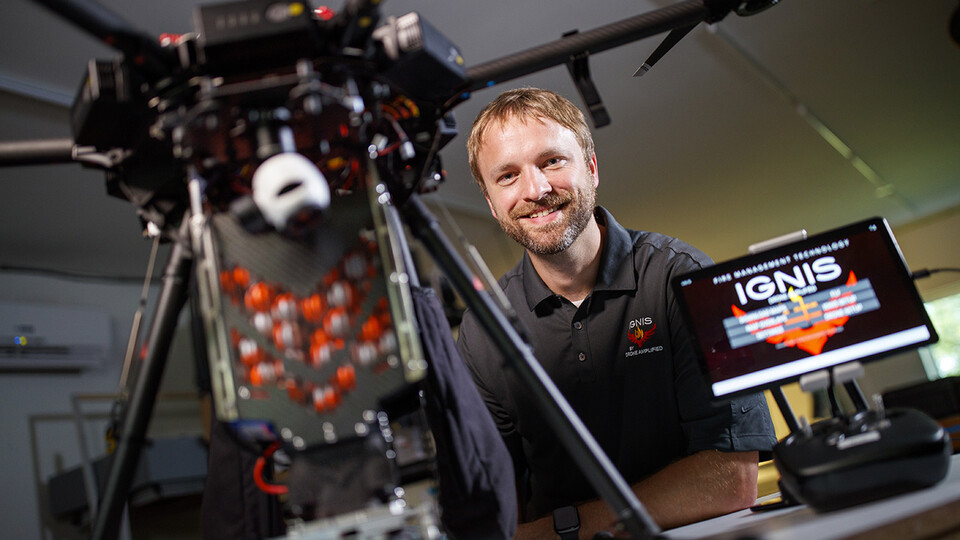Tiffany Lee, February 17, 2021
Drone technology expert Detweiler named NAI senior member
The University of Nebraska–Lincoln’s Carrick Detweiler has been elected a senior member of the National Academy of Inventors.
NAI’s Senior Member program recognizes early-stage innovators and inventors whose success in patents, licensing and commercialization has the potential to positively impact the welfare of society. Senior members are rising leaders in their fields whose work has gained momentum toward significant achievement in innovation. Each member holds a U.S. patent that has been licensed or commercialized and/or five or more issued U.S. patents.
Detweiler, Susan J. Rosowski Associate Professor of computer science and engineering, is the second Husker to receive the honor since the NAI established the program in 2018. The first was George Burba, an adjunct faculty member in the School of Natural Resources.
Detweiler is a nationally recognized expert in research and technology focused on using drone systems to enable safer, less costly approaches to fighting wildfires. He is co-founder and co-director of the Nebraska Intelligent MoBile Unmanned Systems Lab, or NIMBUS, which merges the latest developments in software and systems engineering, robots and sensor networks to develop drones that interact with the environment. To commercialize his work at the university, Detweiler co-founded Drone Amplified in 2015, for which he serves as CEO.
The company helps federal, state and local agencies reduce fire danger through its signature product, IGNIS, a drone-based system that enables the remote ignition of controlled burns.
“I’m excited to receive this honor from the NAI,” Detweiler said. “It’s been gratifying to see our research, which started out as an idea in the NIMBUS Lab, evolve into a company and product that is now helping to save the lives of firefighters.”
IGNIS uses ping-pong ball-sized chemical spheres to set fires in areas identified as high-risk, controlling wildfires by depriving them of the fuel they need to spread. The approach keeps firefighters safely on the exterior of the fire, unlike traditional methods that sent them to the interior in helicopters, all-terrain vehicles or trucks, sometimes at night or through smoke.
The system is also less costly than conventional approaches: According to a U.S. Department of Agriculture study, using an IGNIS drone for fire prevention costs about $1,800 per day, while the traditional method of using manned helicopters totals $16,000 per day.
“We’re thrilled that the National Academy of Inventors is honoring Carrick’s groundbreaking work in developing a drone system that is helping firefighters across the nation,” said Bob Wilhelm, vice chancellor for research and economic development. “It takes only a quick glance at the news to understand the potential of Carrick’s work to positively impact society. Last year, his technology helped Colorado officials fight the largest fire in that state’s history, and we expect to see even larger-scale impacts stemming from his work in the future.”
NUtech Ventures, the university’s nonprofit technology commercialization affiliate, patented Detweiler’s research and provided a license to use the intellectual property for Drone Amplified. These licenses, whether granted to startups or existing companies, create a pathway for continued research and development, ultimately leading to products or services available for sale.
“Carrick’s work with Drone Amplified exemplifies the goals of technology commercialization — transferring innovation from the lab to the marketplace, where it can benefit society,” said Brad Roth, NUtech’s executive director. “Naming Carrick as an NAI senior member recognizes his innovative research as well as his successful business journey. He and the Drone Amplified team understood their customers’ problems and adapted to provide a solution. By placing this technology in the hands of firefighting teams, they’re helping to transform an industry.”
Detweiler’s work highlights just one of the ways Nebraska researchers are focused on climate resilience. The hotter, drier conditions triggered by climate change have fueled an uptick in wildfire frequency and severity: In 2020, U.S. wildfires burned an estimated 10.27 million acres, the highest yearly total since accurate record-keeping began in 1983. At least 43 people were killed, and damage totaled $16.5 billion. As these trends continue, innovative methods of fire management are crucial.
Detweiler, who is a faculty fellow at the Robert B. Daugherty Water for Food Global Institute and the university’s Public Policy Center, holds three patents for technology related to IGNIS, two of which are licensed or commercialized. He leads projects funded by USDA, the National Science Foundation and the Department of Defense aimed at developing systems and software that enable drones to interact with water, fire and crops. In 2016, he received the College of Engineering’s Edgerton Innovation Award in honor of his scholarly research and creative activities. In 2019, NUtech Ventures honored Drone Amplified with its Startup Company of the Year Award.
The NAI will honor Detweiler at its 10th Annual Meeting, slated for Oct. 31-Nov. 3 in Tampa, Florida. Detweiler is one of 63 newly elected senior members this year.






